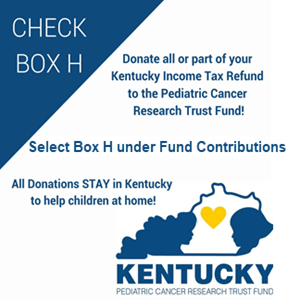 Our Purpose
Our Purpose
The Kentucky Pediatric Cancer Research Trust Fund's mission makes childhood cancer a state health priority and access for all Kentucky children to innovative cancer research, precision therapy with less toxicity and comprehensive psychosocial support. Our efforts include a better understanding of cancer risk factors, epidemiology within the state and health implications of long-term survivorship. Our efforts target the needs and challenges specific to children of the Commonwealth impacted by pediatric cancer to serve as a national model for other states.
Our Vision
To serve as an umbrella organization facilitating pediatric cancer work across the state. We do not exist to compete with other organizations but rather to strengthen and elevate collaborative efforts by serving as a coordinated channel fostering innovation, compassion, and breaking down silos.
Our Impact
Funding from the Kentucky Pediatric Cancer Research Trust Fund (KCPRTF) has fueled a surge in pediatric cancer research within the Commonwealth. At the University of Kentucky, investigators are attempting to figure out why the incidence of brain tumors in children is much higher in Kentucky than in other states. New insights are being made in hard-to-treat cancers such as diffuse intrinsic pontine glioma (DIPG), acute myeloid leukemia (AML), and osteosarcoma (Bone tumor). Finally, programs have been established to identify and care for young people who have inherited a genetic predisposition known to cause cancer. Together with the resources of the Markey Comprehensive Cancer Center and the DanceBlue Philanthropic Organization, UK researchers are working hard to fight childhood cancer.
At the Norton Children's Cancer Institute affiliated with the University of Louisville School of Medicine, great strides are underway to advance pediatric cancer research initiatives. The provision of CAR-T cell therapy is a newfound reality in Kentucky for children with leukemia and lymphoma, and targeted research to expand this immunotherapy to other diagnoses such as solid tumors and brain tumors is now taking place. A multi-site national clinical trial was launched to prevent relapse Medulloblastoma, a common form of childhood brain cancer, and several projects to advance psychosocial care and interventions for cancer-affected children and their families. Due to the patronage of the KPCRTF, along with raiseRED, the Norton Cancer Institute, and the Norton Children's Hospital Foundation, meaningful progress is happening in real-time to combat the realities of pediatric cancer.
To date, two childhood cancer-focused conferences have been held in Kentucky showcasing the research and advocacy that makes Kentucky a national leader in the fight against childhood cancer. The Trust Fund was invited and selected to attend a small working session at the White House participating with representatives across the country.
Our History
The Kentucky Pediatric Cancer Research Trust Fund (KPCRTF) was established in 2015 by Senate Bill 82 and funded $2.5 million each year of the biennium as part of the 2018 budget. In 2022, the budget bill included an additional one-time allocation of $6,750,000 for each fiscal year in 2023 and 2024. In 2024, during the General Session, the KPCRTF was awarded $5,000,000 for each fiscal year in 2025 and 2026 and an additional award amount of $2,000,000 each year during the same time period to support childhood cancer families in Kentucky. This was a record appropriation of $14,000,000. To date, $36,500,000 has been appropriated.
The KPCRTF is an independent board administered by the Kentucky Cabinet for Health and Family Services per statute KRS 211.596 and KRS 211.597. The KPCRTF board meets approximately six times yearly to review grant applications and progress reports.
Pediatric Cancer Trust Fund Application Process
Eligible grant applicants include nonprofits, educational institutions, and Kentucky government agencies. Proposals must offer a program or service to address the needs of the Commonwealth. Typically, the request for applications (RFA) goes out in the spring of odd-numbered years, with applications due in the summer months of those same years. If additional funds become available, supplemental requests for applications will be announced. Links to the RFAs are included below strictly for your reference and informational purposes. Please see contact information below for any questions regarding the process.